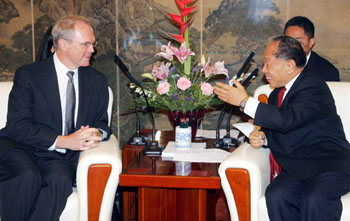US Assistant Secretary of State Christopher Hill said Friday that he hopes
the Democratic People's Republic of Korea (DPRK) can return to the six-party
talks as soon as possible.
He said "the United States is prepared to implement all the elements in the
September agreements," and urged the DPRK to take corresponding actions.
|

US negotiator Christopher Hill (L) meets with
Chinese Foreign Minister Li Zhaoxing in Beijing July 7, 2006. Hill arrived
in Beijing early Friday for a day of discussions with Chinese leaders on
North Korea's missile launches.
[Reuters]
|
The US chief negotiator to the six-party talks on the Korean Peninsula
nuclear issue said he discussed with Chinese officials how to further the
multi-national talks process, which "is still possible."
During his one-day stay in Beijing, Hill met or held talks with Chinese
Foreign Minister Li Zhaoxing, vice foreign minister Wu Dawei and State Councilor
Tang Jiaxuan.
The US and Chinese officials achieved "very good understanding" on the
current situation and its importance, according to Hill.
The United States hopes "to work together with China to deal with the
situation", he noted.
Hill made the remarks upon leaving Beijing after a brief stay here aimed at
discussing with the Chinese side on how to break the deadlock on the Korean
Peninsula nuclear issue.
During an hour-long meeting with Tang, Hill said the US administration
attaches importance to the six-party talks and is willing to settle problems via
diplomatic efforts.
Tang said China is deeply concerned over the current situation and will
constantly maintain its efforts and close contact with all parties involved in
preserving peace and stability on the Korean Peninsula to realize
denuclearization there and push forward the six-party talks.
China strives to preserve peace and stability on the Korean Peninsula, and to
push forward the six-party talks on the nuclear issue, Tang said.
The talks, which has undergone five rounds, involves China, the DPRK, the
United States, Republic of Korea (ROK), Russia and Japan. The talks issued a
joint statement last September, which includes pledges from all the parties,
including the United States and DPRK.
After Wednesday's test-firing of missiles by the DPRK, Chinese President Hu
Jintao held a phone conversation with his US counterpart George W. Bush Thursday
evening.
Hu told Bush China is committed to maintaining peace and stability on the
Korean Peninsula and opposes to any actions that might intensify the situation.
"Under such a complicated situation, it is highly necessary for all the
related parties to keep calm and show restraint," Hu said.
Kenichiro Sasae, Japan's chief negotiator to the six-party talks, also met
with Wu Dawei Friday afternoon.
According to early reports, Wu, China's top negotiator to the six-party
talks, will accompany Chinese Vice Premier Hui Liangyu on a visit to the DPRK
next week.
Hill said at the airport he hopes the visit by Chinese officials to the DPRK
will help solve the problem.